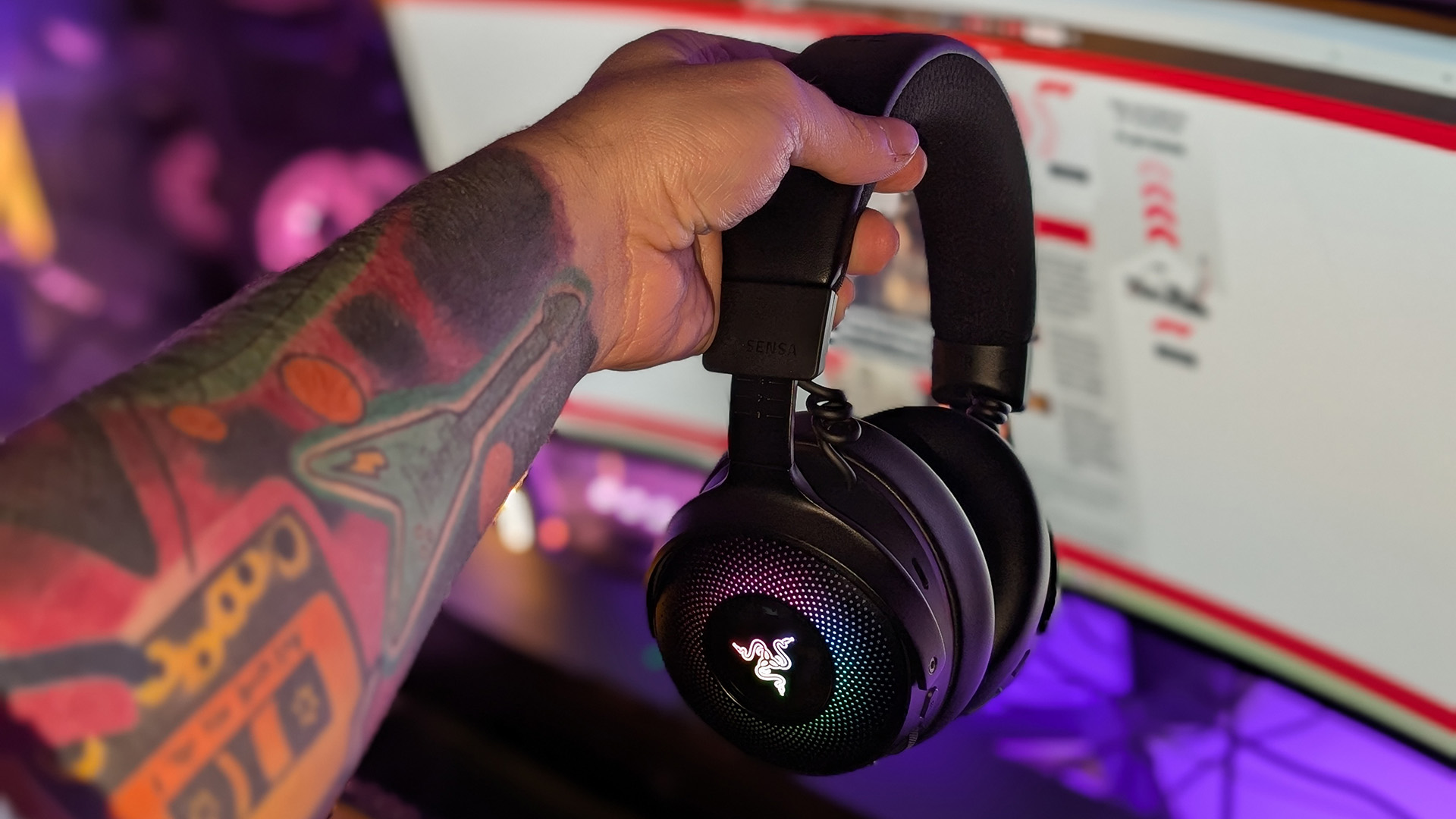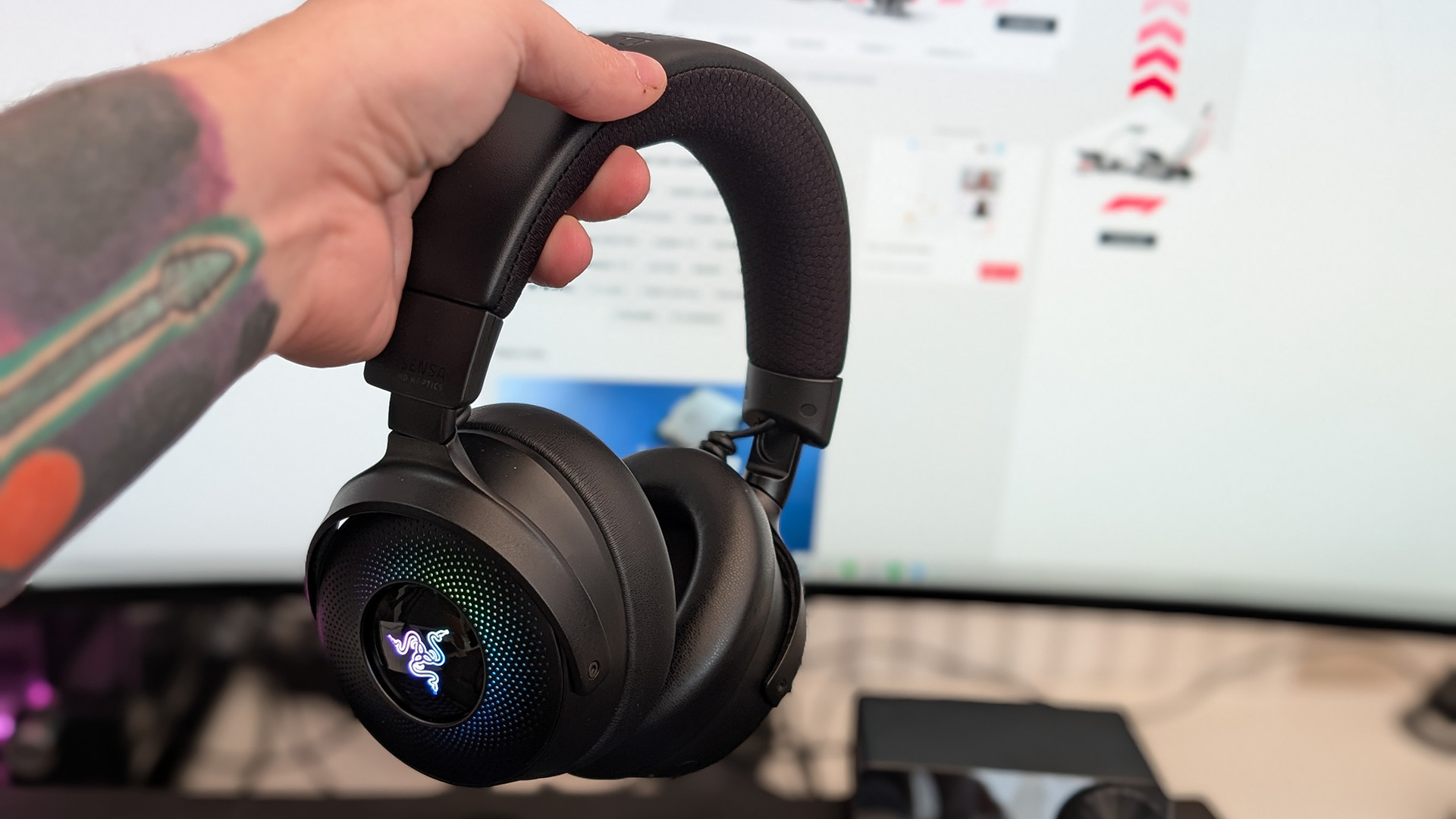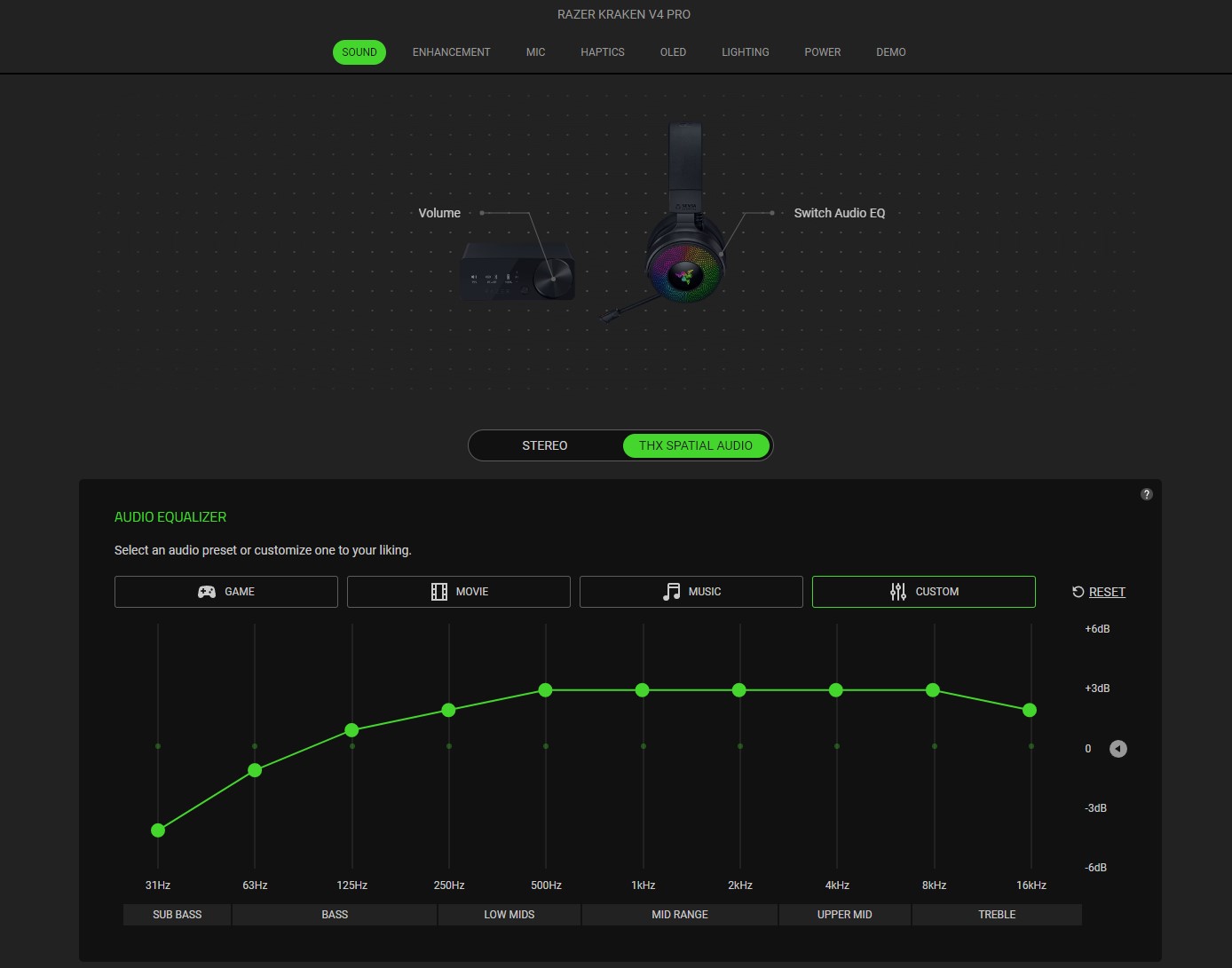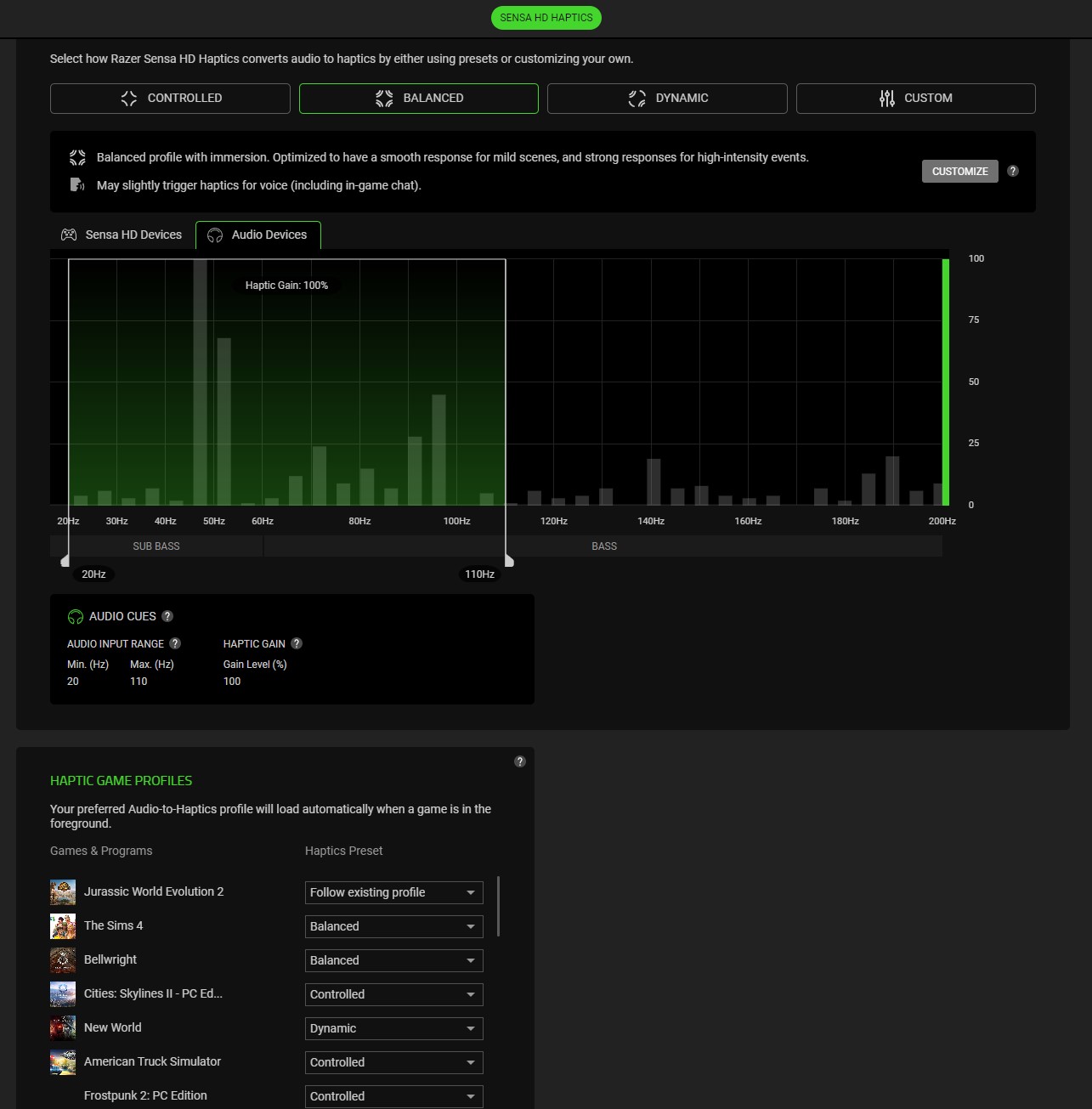Over the years, my gaming setup has shown off my internal battle, as Razer and Corsair vie for not only my attention but also a space atop my gaming desk. While they’ve both taken their fair share of turns to win me over, Razer has just taken the crown with the Razer Kraken V4 Pro.
The Razer Kraken V4 Pro might be expensive at $400/£400, but its stylish RGB design, Sensa HD haptics, solid battery life, and handy base station do a lot to justify its eye-watering price. Of course, all this is wrapped up in the Kraken’s iconic design.
With Razer’s Synapse 4, you get access to an audio equalizer across both stereo and THX Spatial Audio, as well as the option to set default profiles for specific games. Not only does the sound tab give you a full equalizer and sound profiles, but it also lets you split the volume between chat and audio.
Out of the box, the Razer Kraken V4 Pro’s sound is decent, but not on par with some of the best gaming headsets out there. But after a bit of tweaking each of the audio profiles I managed to create the perfect audio profiles that matched the sound quality of some of the best headsets I’ve ever tested.

Connectivity: 2.4 GHz, USB, Bluetooth (AAC, SBC)
Drivers: 40 mm
Driver Type: Razer TriForce Bio-Cellulose
Impedance: 32 Ω (1 kHz)
Frequency Response: 20 Hz – 28 kHz
Microphone Type: Retractable
Pick-up Pattern: Unidirectional
Virtual Surround Sound: THX Spatial Audio
Battery Life: Up to 50 hours (Haptics and lighting off, 2.4 GHz connection)
RGB Lighting: Razer Chroma RGB
Compatibility: PC, Mac, PS5, Nintendo Switch, Android, iOS
Price: $400/£400
I found the mids to be slightly underwhelming, especially in games, but again, this was easily resolved with a few tweaks in the EQ. If you find yourself screaming it’s all about the bass at your screen right now, fear not, without any tweaking needed I quickly found myself immersed in the sound of explosions with a booming bass on games like Call of Duty, which were only amplified by the rumble of the haptic feedback.
Out of the box, I would say the Razer Kraken V4 Pro offers the same audio experience you would expect to see in a cheaper mid-range gaming headset, but with minimal tweaking in Razer’s incredible Synapse 4 software, they easily become a top contender, offering premium sound across games, movies, and music.
Of course, when it comes to picking the best gaming headset, comfort should always be at the forefront of your mind. If you’re planning to enjoy long gaming sessions, you want a headset that’s going to feel comfortable, especially during longer gaming sessions.
The Razer Kraken V4 Pro ditches the Razer Kraken V4’s mesh cover in favor of leather earcups. Not only does this make them more comfortable, but Razer also claims it’s more conductive, and therefore improves the haptic feedback. While it feels unlikely the move to leather would make that much of a difference when it comes to haptic feedback, the added comfort the plush leather earcups offer is a welcomed addition.

After trying and testing multiple premium gaming headsets, the Razer Kraken V4 Pro is by far one of the most comfortable headsets I have ever tried. In fact, after gaming with them for several hours, I found that even with the haptic feedback on full, I still found them to be among the most comfortable headsets I have ever worn.
The headset itself comes with all the controls you could need at your fingertips, without needing to use the base station or Razer Synapse 4. It includes buttons to mute the microphone, change the haptic intensity, and audio profiles, as well as a simple-to-use scroll wheel to adjust the volume.
Although the Razer Kraken V4 Pro is easy enough to control from the headset itself, the base station does make it easier. With access to change most of the headset settings and audio profiles with an easy-to-use dial, and an OLED screen, most settings can be changed quickly without needing to take you out of the game for too long.
Just like everything else on the Razer Kraken V4 Pro, the OLED screen on the base hub is also completely customizable via Razer Synapse 4. With multiple animations to choose from, including timeout displays, and the option to adjust the brightness and how long it takes to timeout, there’s plenty here to make it fit in with the rest of your gaming setup.
You can even have it display information such as the music you’re playing, and key information about components in your gaming PC, or you can just go for an emoji, because, why not?

The hub also features two USB-C ports for changing between PC and console, as well as an auxiliary port. Running the Razer Kraken V4 Pro on your console is as simple as switching to the console port and plugging in the hub. However, the headset doesn’t work with Xbox consoles, which is something to consider if you’re looking for a PC/Xbox headset.
Thanks to Bluetooth, you can even use the Razer Kraken V4 Pro on your Steam Deck, Nintendo Switch, and other handheld gaming PCs/consoles.
Great audio isn’t the only thing you need to worry about when choosing a new headset. The microphone itself needs to be impressive enough to warrant such a high price tag. Thankfully, the Razer Kraken V4 Pro’s HyperClear super wideband microphone offers incredible clarity with a 32 kHz sampling rate.
Using Synapse 4 you can easily enhance the microphone with quick settings such as vocal clarity, noise cancelation, and noise gate, which changes the threshold in which noise is registered through the microphone.
Like the audio equalizer, you can adjust the microphone equalizer settings or use one of Razer’s three pre-built equalizers for streaming, conferences, or to boost the microphone. Each of the equalizers changes how your haptics feel in a dramatic way.
I’ve personally found that Balanced offers the best haptic performance for music, while Dynamic has been my go-to preset for more action-packed games, such as Call of Duty. Controlled seems to offer a more middling experience, which I found perfect for games like Frostpunk 2.

Ultimately it all comes down to personal preference, which is why I have opted to create defaults for each of my games, finding the perfect immersive haptic experience per game
Of course, the star of the show here is the HD haptics. Whatever you’re playing or listening to will provide HD haptic feedback based on audio. Essentially, you can feel every beat, every footstep, and anything that makes noise.
If you’re using the audio-to-haptics mode, there are three profiles you can switch between, as well as a custom profile. But with each profile completely switching up how the HD haptics feel, I found it best to set individual game profiles, adding the right feedback to suit each game.

If you want a more immersive experience, there is a list of Sensa HD integrated games that have been designed to pick up on certain actions in-game, offering a more immersive gaming experience.
While the audio-to-haptics mode has completely blown me away, I’ve found myself a little less impressed with the Sensa HD games mode. It’s been designed with the help of game developers to pick up on physical cues in the game.
Each action in-game has its own intensity designed to match the gameplay, however, after trying it out in Frostpunk 2, New World, and a handful of other supported games, I quickly found myself moving back to the audio-to-haptics mode for more immersive haptics. Ideally, I would have liked to have seen a mode that combined both audio-to-haptics and Sensa HD running at the same time. With developer-prompted gameplay cues offering more intense haptics.
Lastly, and certainly not the least important thing to consider when looking at a wireless headset, is the battery life. If you’re using all the bells and whistles, such as haptics on a higher intensity and RGB lighting, you can expect around 13 hours of battery life from the Razer Kraken V4 Pro.
✅ You want a highly customizable headset with audio you can feel: If you’re looking for an impressive headset with high-quality drivers, powerful haptic feedback, and THX Spatial Audio, prepare yourself for a fully immersive experience with the Razer Kraken V4 Pro.
❌ You want an affordable headset for PC and Xbox: The Razer Kraken V4 Pro might be one of the most impressive haptic headsets out there, but if you’re looking for an affordable option with Xbox support, it might not be the right option for you.
But, if you’re willing to turn those off, and use the 2.4 GHz connection, you can get up to an impressive 50 hours of battery life instead. But let’s face it, no one wants to buy a gorgeous RGB-laden, haptic headset just to turn off its best features. So in reality, if you’re using the headset as intended, you can expect it to last around 13 hours.
The Razer Kraken V4 Pro can be used wired, so if you want to keep the lights on and the haptics going, simply plug it in and enjoy it in all its glory while it charges.
While there’s a lot to love here and trust me when I say I have loved every second I’ve used the Razer Kraken V4 Pro for both gaming and listening to music. It’s hard to ignore the excessive price tag. At $400/£400 it’s an extremely high price for RGB lighting and to have your head essentially vibrate as you play.
I would say yes. I would happily buy the Razer Kraken V4 Pro without hesitation. On the surface, they’re comfortable, offer incredible sound, and immerse me in my gameplay in a way other headsets can’t often achieve. But, if features such as pretty RGB lights and haptic feedback aren’t important to you, it might be worth considering a cheaper option like the HyperX Cloud Alpha.






